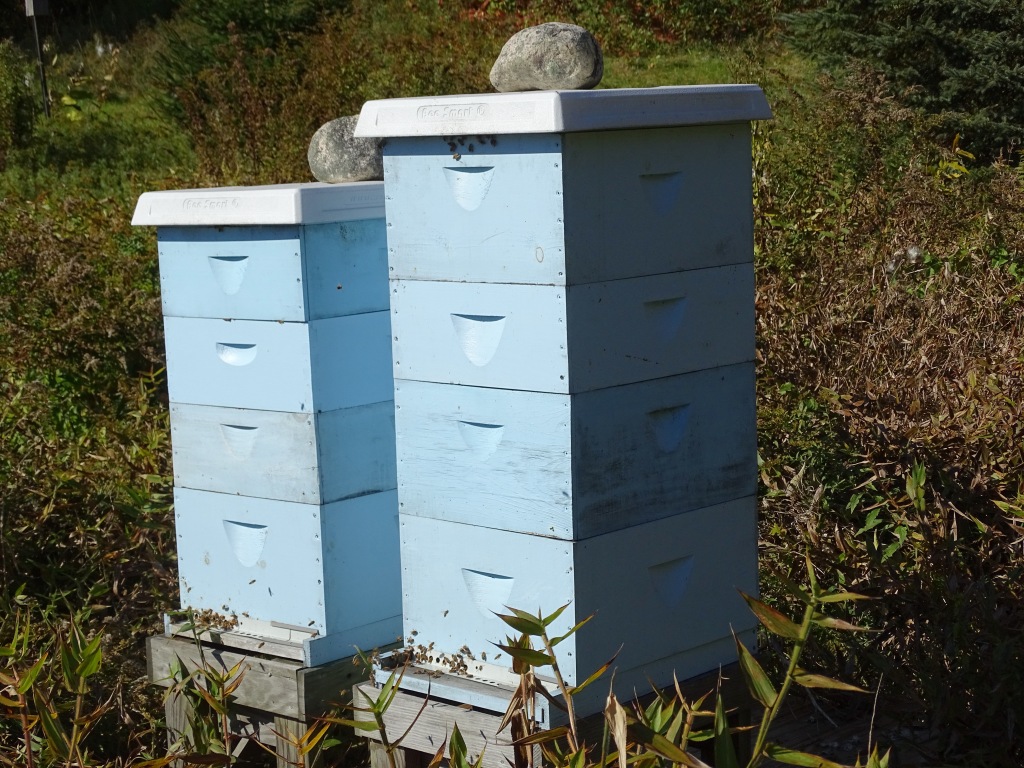Adieu beekeeping
Steve came Friday with 2 Kates to collect the last of my beekeeping equipment to use in his research at URI on insect behavior in the field. I had given 2 hives to Emily and Ryan a couple of years ago for their farm, but I still had medium boxes, supers, frames, foundation, Imirie shims, a nuc box, empty package containers, a smoker, a queen excluder, entrance restrictors, a manual extractor and various honey collecting and straining tools. I forgot to give them 2 hive tools, but I did include 3 bonnets I had on hand for hive visitors. I still have some bee suits, leather gloves and a library of bee keeping books. I also still have some honey.
This is the end of an era for me. I learned beekeeping in the early 1990s through the Montgomery County Beekeepers Association led by George Imirie, a master beekeeper. He wrote, and we studied, his “pink pages” — distillations of everything you needed to know about beekeeping. He was a drill sargent. He’d bark questions at us. If you didn’t have the correct answer right away, he’d remind you of the 2 classes of beekeepers: “You’re either a beekeeper or a beehaver.” Surely he pegged me as a beehaver. But at least once I had the right answer to a question because I won a 2-quart plastic jug with a lid previously used to transport oysters. I did not give the jug to URI; It may be my beekeeping diploma. George had been studying for an advanced degree in atomic engineering when the US joined World War. He subsequently worked at the Manhattan Project. He was never — or he never told us he was — investigated for that work. I wonder what he would think of all the attention to Oppenheimer these days. He left the bomb-making world for a family-owned auto repair shop.



The meadow is hardly empty without the Apis mellifera I kept for so many years. In fact, I still see descendants of my honey bees on plants in the garden and the meadow. One consolation in giving up beekeeping is to think that perhaps the insect balance is better without the non-native bees. And I have learned the names of a number — but by no means all — of the myriad winged insects who live in the meadow. I miss the Apis mellifera ladies though. They smelled so good. They made such delicious honey. They entertained my grandchildren — most of my visitors, really. And they never stopped reminding me that I was a beehaver; they could keep themselves.

Lovely
Hi Susan,
Sorry to hear your beehive days are over. It was fun while it lasted, I’m sure. Wasn’t hive collapse the beginning of the end. You are doing your fair share with a meadow that supports lots of pollinators.
Love, Nancy
Lovely.
You did a good job with the hives while it lasted..now the wild bees are enjoying your garden and making their own way in the world. Just like kids they’ve flown the coop!
It seems that you still have all the pollinator functions covered. You just have to buy honey. I know a bit what it is like to give up a long-term dedicated activity, as I’m preparing to leave Seed Starters after Plane View closes….. After 32 years.
Dorothy
>
That was a fun memory you shared. We were talking about Mason Bees and thinking maybe we should get a home for them… but then … wondering maybe we already have places for them but a home we provide might provide more of an observation focus. Stay tuned…ML & Ken